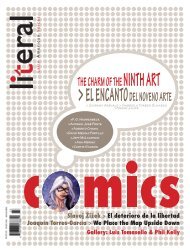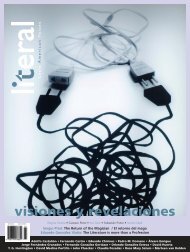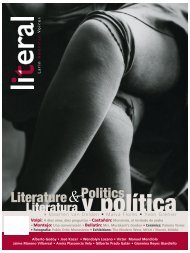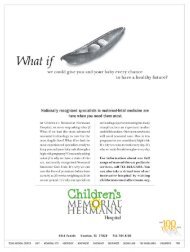Richard Serra - Literal
Richard Serra - Literal
Richard Serra - Literal
You also want an ePaper? Increase the reach of your titles
YUMPU automatically turns print PDFs into web optimized ePapers that Google loves.
existencia y se recubren con nuestro polvo. Pero no son<br />
sólo agentes de un pasado remoto y clausurado. Hay<br />
cosas que nos comprometen, como los cuadernos en<br />
blanco en los que habremos de escribir algo, aunque<br />
sea insensato. El caso es que mantenemos con ellas<br />
una relación que sólo termina cuando se extravían para<br />
siempre, cuando las desechamos o morimos. Y como<br />
toda relación, la que se establece entre los hombres y<br />
las cosas también es imperfecta, sinuosa.<br />
El mayor problema es el lugar que ocupan o habrán<br />
de ocupar. Ese lugar siempre es precario, porque las<br />
cosas se animan en cuanto las tocamos. Cambian de<br />
sitio, se congregan, se hacinan, les encanta la sedición.<br />
La pluma se cae de la mesa y se queda en el suelo. Pero<br />
sólo en apariencia está quieta. Mañana la encontraremos<br />
reunida con otras plumas entre nuestras cobijas.<br />
Y no es que las cosas broten de la nada; más bien, su<br />
desacomodo emana de nosotros mismos.<br />
Una regla elemental del buen anfi trión exige arreglar<br />
la casa antes de que lleguen las visitas. Eso podría<br />
tener algo de forzado e hipócrita, si no entrañara una<br />
razón más legítima: la de resguardar la vida privada.<br />
Si están intactos, los objetos se muestran refractarios,<br />
parcos. En cambio, el desorden desnuda. Un cenicero<br />
pululante, un suéter enredado, un número telefónico<br />
olvidado en un sillón, pueden revelar más sobre<br />
un desasosiego íntimo que un diván de psicoanalista.<br />
Poner las cosas en su sitio es, entonces, una forma de<br />
esconderse. Sin embargo, siempre hay algo que escapa<br />
a la previsión del propietario y lo pone al descubierto.<br />
“¡Así que estás leyendo a Malatesta, tú que te decías<br />
un reaccionario!”, exclama alguien con insidia al descubrir<br />
un libro en el suelo. Esos deslices, esas ranuras<br />
indiscretas, son inevitables, porque en un lugar donde<br />
se habita realmente no es posible aniquilar el desorden.<br />
Eso es algo que yo he comprendido hace tiempo<br />
y, por lo tanto, no opongo ninguna resistencia.<br />
Para qué disimularlo; en mi caso, el desorden siempre<br />
sobreviene, ocurre, acaece; me atrevería a decir incluso<br />
que es. Pero no se trata en ningún caso de una<br />
irrupción violenta o arbitraria. Su procedimiento es<br />
más bien la acumulación gradual y cíclica: comienza<br />
por recaudar hojas dispersas, luego persuade a dos o<br />
tres libros, más tarde se expande hasta la provincia de<br />
las tazas, y así, lenta pero inexorablemente, va edifi -<br />
cando su imperio, hacia arriba, hacia abajo, hacia los<br />
bordes, hasta confi gurar un paisaje tan pródigo y abigarrado<br />
que apenas puedo enunciarlo de memoria: en<br />
mi dormitorio, la cama revuelta, libros desparramados<br />
sobre el banquito que hace las veces de buró, botellas<br />
de agua (generalmente vacías), un paquete de cigarros<br />
(también vacío), cartas de otra época que suelo<br />
releer antes de acostarme, pantalones colgando de las<br />
sillas, la declaración de impuestos (en borrador), pastillas<br />
para el dolor de cabeza, una pata de elefante,<br />
el Opium de Cocteau, piedras de río, alguna revista<br />
come to life as soon as we touch them. They change<br />
place, they pile up, they congregate, they conspire. The<br />
pen falls from the table and lies on the fl oor. But it only<br />
seems to be at rest. Tomorrow we shall fi nd it together<br />
with other pens in our bedclothes. And it is not that<br />
things spring up from nothing, but rather that they are<br />
subject to the fl uctuation of our inattention and our<br />
enthusiasms, they move at the unpredictable rhythm<br />
of our actions: their disarray emanates from ourselves.<br />
One of the basic rules of a good host demands that<br />
the house be put in order before the guests arrive. This<br />
might seem forced and hypocritical were it not derived<br />
from a more legitimate rationale: the right to privacy. In<br />
their proper place, objects are restrained and impervious;<br />
disorder, on the other hand, denudes them. An<br />
overfl owing ashtray, a tangled sweater, a telephone<br />
number forgotten on an armchair may well reveal more<br />
of some intimate unrest that the psychoanalyst’s couch.<br />
To put things where they belong, therefore, is a way of<br />
hiding them. But there is always something that escapes<br />
the circumspection of the owner and gives the game<br />
away. “So you’re reading Malatesta, you who claim to<br />
be a reactionary!” exclaims someone with malice on<br />
fi nding a book on the fl oor. These slips, these breaches<br />
of discretion, are inevitable, because in a place where<br />
someone really lives it is impossible to annihilate disorder.<br />
That is something I came to understood a long time<br />
ago, which is why I no longer put up any resistance.<br />
But why pretend? In my case, disorder always ensues,<br />
it results, it supervenes; I would even dare to say:<br />
it is. But it is never a case of a violent or arbitrary breaking<br />
in. It happens rather by gradual and cyclical accumulation:<br />
it begins by enlisting some scattered papers,<br />
then it persuades two or three books, later on it spreads<br />
to the region of coffee cups, and so, slowly but inexorably,<br />
it establishes its empire, upwards, downwards,<br />
on all sides, giving shape to a landscape so varied and<br />
prolifi c that I can hardly give expression to it by memory:<br />
in my bedroom, the bed unmade, books strewn on<br />
the little bench I use as a bedside table, bottles of water<br />
(usually empty), a pack of cigarettes (also empty),<br />
mysterious letters that I am in the habit of rereading<br />
before going to bed, pants hanging over the backs of<br />
chairs, a rough copy of my tax return, painkillers, an<br />
exotic plant, a copy of Cocteau’s Opium, stones from a<br />
riverbed, a literary journal from 1991, some unfi nished<br />
notes, a well-thumbed dictionary; in my study, whose<br />
panorama is almost the same, ashtrays full of cigarette<br />
butts, messages on little pieces of paper, old newspapers,<br />
two bookcases (insuffi cient), unopened envelopes,<br />
worthless undated drawings scattered about, a<br />
few teacups and, of course, my desk which is a sort of<br />
disorder among the disorder, that is, an uncountable<br />
universe. (For admirers of the detailed inventory, I recommend<br />
the one drawn up by Perec of the things on<br />
his worktable, in Penser/Classer, 1985).<br />
OTOÑO, 2007 • LITERAL. VOCES LATINOAMERICANAS 3 27






